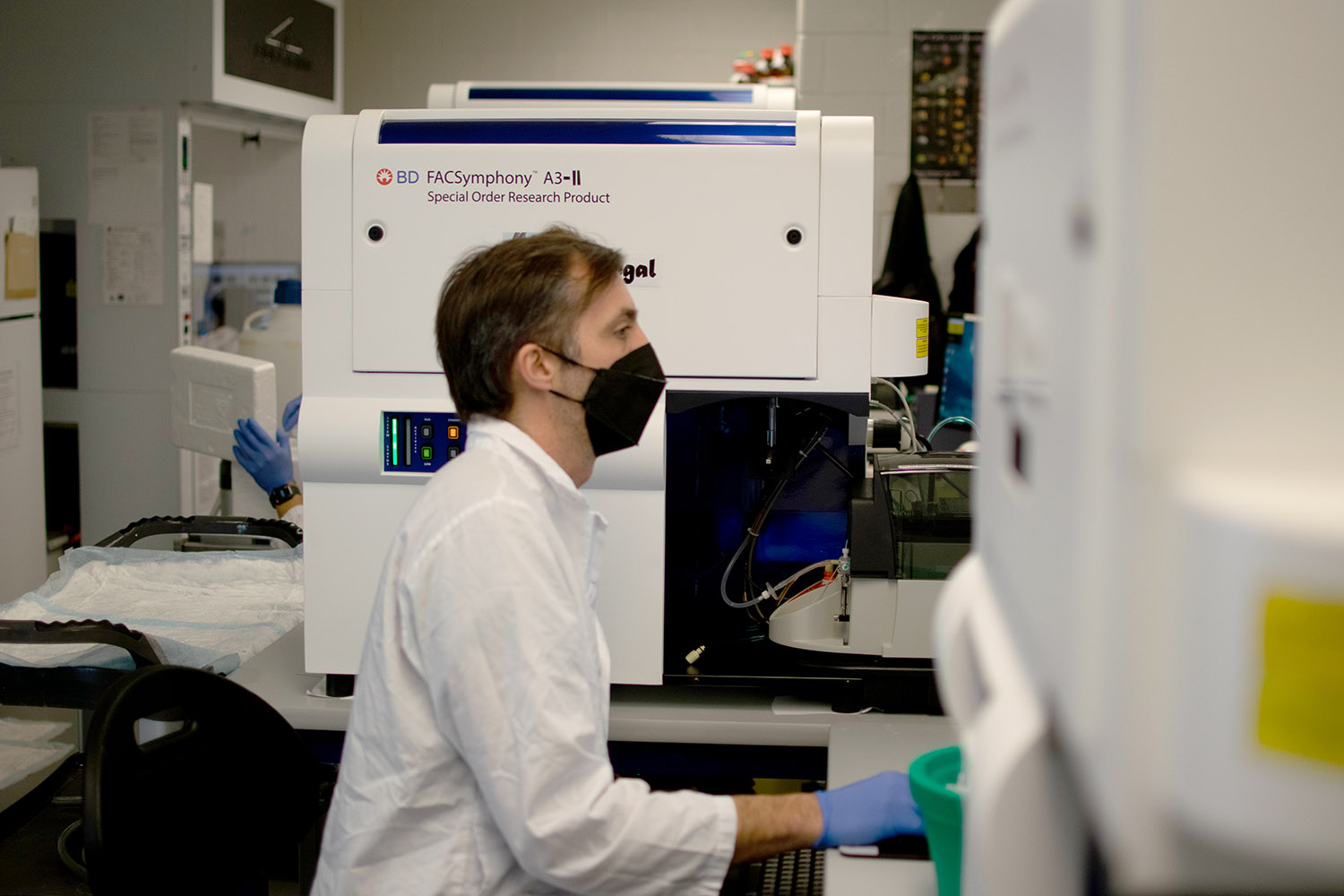Operator Assisted Cell Sorting
- Cell sorting on our (4 lasers) BD FACSAria™ IIIu or (5 lasers) BD FACSymphony™ S6 SE requires the skill of a trained operator to acquire, analyze, and eventually sort cells based on client directives.
- Sorting is performed in Class IIA biosafety cabinets.
Operator Assisted Data Acquisition & Analysis
- Clients who have not been trained to use the analysis systems or who are interested in achieving quick and reliable results may request professional service to acquire and analyze their data. Once acquisition is complete, operators may explain results and also provide data summaries, which may include publication ready images (if requested).
Software Tutorials
- To better understand your data and its analysis our staff can teach you to use popular data analysis platforms so you can create your own publication ready figures and statistics for your data sets.
BD FACSMelody™ Unassisted Cell Sorting
- Regular clients of the flow cytometry facility that have been trained by us to use our analyzers can receive training to sort their own samples on the (3 lasers) BD FACSMelody™.
- Qualifications will be assessed by our staff prior to agreeing to the training.
Instrument Training For New Users
- Cell sorting on our (4 lasers) BD FACSAria™ IIIu or (5 lasers) BD FACSymphony™ S6 SE requires the skill of a trained operator to acquire, analyze, and eventually sort cells based on client directives.
- Sorting is performed in Class IIA biosafety cabinets.
Lab Orientation & Training For Experienced Users
- Clients who have not been trained to use the analysis systems or who are interested in achieving quick and reliable results may request professional service to acquire and analyze their data. Once acquisition is complete, operators may explain results and also provide data summaries, which may include publication ready images (if requested).
Unassisted Acquisition
- (4 lasers) BD LSRFortessa™ - $40/hr
- (5 lasers) BD LSRFortessa™ X-20 & X-20 II - $45/hr
- (5 lasers) BD FACSymphony™ A3-I & A3-II - $50/hr
- (5 lasers) BD FACSymphony™ A5 SE - $55/hr
Non-Academic Services - Inquire for pricing
Operator assisted and unassisted usage rates can be provided upon request for companies and/or non-profit groups wishing to use the flow cytometry facility.

Analysis Software:
Copies of Flowjo software may be purchased for internal laboratories at the University of Toronto for a discounted rate (~375 CAD/license/year).
- Licenses are charged annually from June to May to the Principle Investigator’s account.
- Available only to labs directly financially linked through the University of Toronto.
- Please contact the flow cytometry facility to initiate the registration process via email. Please include the hardware/MAC address for your system in the message.
- To locate the hardware address for your workstation:
- Run the cmd function and enter “ipconfig/all” in the dos window.
- Open System Preferences located under the apple icon.
- Once you have opened System Preferences, click on “Network”.
- Choose the type of connection you are using (e.g. Ethernet) and double click on it.
- Please ensure to email the Ethernet ID.
- For users who do not wish to purchase software licenses, a no-cost stand alone workstation is available in the flow cytometry facility.
- The workstation is available on a first-come, first-serve basis.
Training
Flow Cytometry Theory:
The University of Toronto’s Flow Cytometry Facility is pleased to announce a partnership with WORK-FLOW™ to bring a comprehensive (3 hours, 37 minutes, 4 seconds) online flow cytometry curriculum to its training program. All new registrants will be required to participate in the WORK-FLOW™ program regardless of previous experience or unless they can provide earlier WORK-FLOW™ certification.
There are a minimum of five requisite sections (average time/section, 30 minutes 34 seconds) to review with an optional sixth course (1 hour, 4 minutes, 16 seconds) if you plan to operate the BD FACSMelody™ for sorting. Each section has their own testing phases. The five core sections cover the following topics:
Details the process of generating data with emphasis on the integration of an instrument’s three main systems (fluidics, optics, and electronics) (Time, 00:31:24).
Explains the use of antibodies and their fluorescent conjugates in flow. Concepts such as spectral overlap and compensation are also discussed (Time, 00:34:45).
Explains the types of controls necessary for a successful flow cytometry experiment. Additional information on the sources of experimental variability are discussed along with methods for addressing them and standardizing experiments for consistency between runs. A separate presentation on compensation theory is also provided (Time, 00:27:37).
Reviews how data is displayed and interpreted, selecting populations for analysis via gating, and common data presentation formats for analysis and publication (Time, 00:29:06).
Reviews the differences between descriptive and inferential statistics along with standard student’s t-tests (Time, 00:29:56).
Provides an overview of the operational mechanics of a cell sorter. In this course you will learn: how to select nozzle size, sheath pressure, droplet breakoff, stream charge/deflection, collection, drop delay, acquisition/gating on your population of interest, conflicts, sorting, post-sort purity, recovery, and yield, sample standardization, temperature/pressure variables, collection media, and biosafety (Time, 01:04:16).
Within these five to six modules, WORK-FLOW™ is filled with a wealth of flow cytometry related information that clients will find very valuable and are encouraged to explore on their own.
Test results must be presented to the flow cytometry facility before instrument training can be scheduled.
COST: $125/CLIENT
- Introduction to flow cytometers and using BD FACSDiva – 3 hours @ $150/person, held in groups of two.
- Covers a walk-through of the instrument start-up, quality control check, instrument cleaning, and shut-down procedures.
- Elements of the acquisition software will be demonstrated with fluorescent beads including: detector selection, compensation, drawing analysis templates, and saving application specific settings.
- Follow-Up Session 1 – 3 hours @ $200/person, held one-on-one with a dedicated instructor, required.
- An instructor will guide you through the optimization of your own samples on an instrument.
- Experiment standardization and data export will be covered.
- Follow-Up Session 2 – 3 hours @ $200/person, held one-on-one with a dedicated instructor.
- This session may or may not be required for simple experimental set ups 1- 4 colours.
- Mandatory for all experimental assays with greater than 4 fluorescent parameters.
The average cost of training varies between $550 – 750+, depending on experimental complexity. Please contact us to discuss your plans to receive an estimate of training costs for your application.
- WORK-FLOW™ training is required – $125/person
- described above
- Guided facility orientation and sample set-up – $90/hour
- An instructor will guide you through our laboratory’s safety features, instrument start-up and shut down, configurations, and quality control procedures.
- The instructor will observe your experimental set-up procedures (correcting any bad habits acquired) and will provide suggestions to improve data quality where appropriate.
- One follow-up session – $90/hour
- May or may not be required depending on the level of skill observed by the trainer at the initial orientation session.
- Training is only available to students and employees of the University of Toronto and its affiliated research institutes (within the University Health Network).
- Training will only be provided for those investigators who become regular users of our facility. i.e. if you intend to acquire your data at another facility please seek instruction at that location.
- Due to the busy nature of the flow cytometry facility, there is usually a 2-week wait time between a request for training and the first hands-on session.
- Hands-on training should only begin when you are almost ready to regularly run samples (3-4 weeks).
- WORK-FLOW™ must be completed before this step – time to complete the course should be factored into your planning.
- Software training is quite intensive and it will take repeated solo practice sessions to become proficient.
- A large gap between initial training and follow-up sessions is not recommended.
- Training is only provided for the analyzers.
- It will take approximately 10-12 hours to solidify the concepts learned during the course. Trainees are expected to practice on their own and request additional training time if necessary.
- If after the completion of both follow-up sessions our instructors feel that more training is required, additional sessions will be charged at the hourly operator rate of $90/hour.
- Cancelling training session with less than 48-hour’s notice will result in the full charge of the session being added to your account.
Registration:
Please download our registration forms to become a facility member to gain access to the WORK-FLOW™ program and start the instrument training program.

Learn More

Work around very talented people.
Meet the friendly and diverse team that keeps the University of Toronto Flow Cytometry Facility running on a day-to-day basis.
7226-1 King’s College Circle
Medical Sciences Building University of Toronto
416-976-6524

